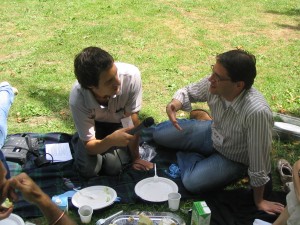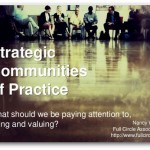 I’ve had a long association with the Agricultural Sustainability Institute at the University of Davis and I get the opportunity to lend a hand here and there on projects. The latest in the MacArthur Foundation funded Digital Portfolio/Badges project that Joanna Normoyle is working on for the new Sustainable Agriculture major. The problem is this: I don’t really know much about this sort of thing. I’ve been a long time skeptic about badges, but Joanna sucked me in by asking about how we can build more reflective practices into the system and that, my friends, excites me.
I’ve had a long association with the Agricultural Sustainability Institute at the University of Davis and I get the opportunity to lend a hand here and there on projects. The latest in the MacArthur Foundation funded Digital Portfolio/Badges project that Joanna Normoyle is working on for the new Sustainable Agriculture major. The problem is this: I don’t really know much about this sort of thing. I’ve been a long time skeptic about badges, but Joanna sucked me in by asking about how we can build more reflective practices into the system and that, my friends, excites me.
So the next thing I thought was — I need to tap my network! I sent out a tweet and pretty soon some terrific people responded. Of course, this was also when I was crazy busy so I decided instead of tweeting back, I’d start this blog post with an offer. How about it @soletelee, @openbadges, @lbraun2000, @emgollie @eknight , @kwerb, @pblhq, @dlnorman, @carlacasilli from Mozilla, @donpresant, @VennLibrarian and @dajbelshaw (“the badge guy for Mozilla Foundation.”) Care to jump into a little peer assist?
Joanna and I wonder if you’d like to find 30-60 minutes for a Google+ Hangout where Joanna can show you the thinking so far and just get some feedback. Are you game? If yes, leave a comment here. Joanna and I will try and find some time in the next ten days.
Update: Meeting time fixed!
Hi Everyone,
Thanks for filling out the doodle. It looks like tomorrow, 11/27, 11:30-12:15 PST will work well.
Here’s the meeting link and talk soon!
Joanna
1. Please join my meeting, Nov 27, 2012 at 11:30 AM PST.
https://global.gotomeeting.com/join/357610317
2. Use your microphone and speakers (VoIP) – a headset is recommended. Or, call in using your telephone.
Dial +1 (805) 309-0027
Access Code: 357-610-317
Audio PIN: Shown after joining the meeting
Meeting ID: 357-610-317
